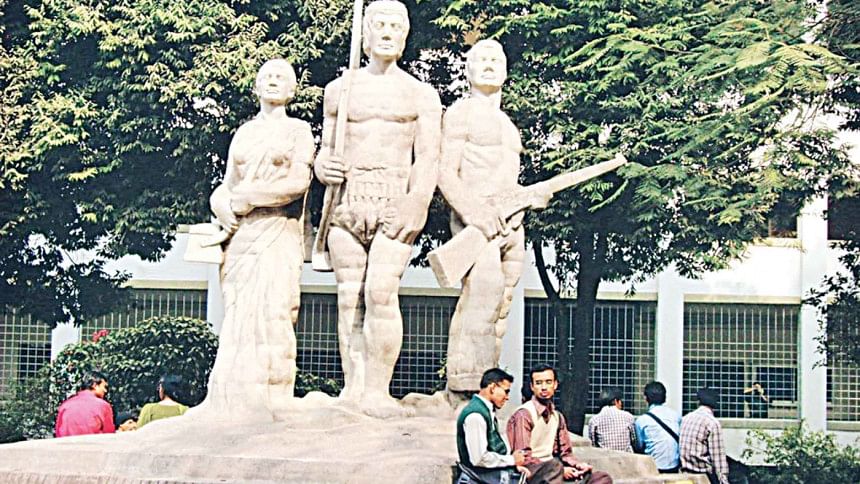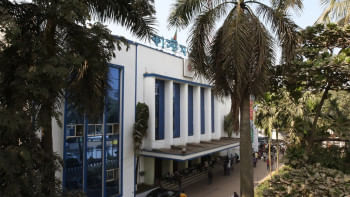DU in the 21st Century

In a futuristic convocation speech, Sir Philip Joseph Hartog, the first vice-chancellor of Dhaka University (DU), stated: "A man may be an excellent teacher of elementary subjects without the power to add to knowledge. But in advanced work I maintain that no one can really teach well unless he has the combination of imagination with critical power which leads to the original production (of knowledge), and for that, if for no other reasons, a university to be a true university must see that its teachers are men who are also capable of advancing knowledge."
Sir Philip's vision set the trajectory for the university that transformed itself into what many fondly remember as the Oxford of the East, with its brilliant faculty vying for global standing. Today's DU, however, has lost much of that glitter: its brand has taken a serious hit. With a proud hundred-year heritage, it has some introspection to do, and some goals to strive for as more recently established universities (in Asia) have surged ahead in a spirit of academic enterprise, competition, and determination to establish stellar reputations.
Dedicated faculty members of DU have, over the years, continued the tradition of scholarship and maintained its good name at home and abroad. Former students of the university, now established in global institutions, have also carved out distinctive niches for themselves while continuing to brighten the name of DU. It is their goal orientation, work ethic and dedication that is instructive and must be imbued today across the different departments of the university, as it looks forward to its next 100 years as a centre of excellence.
The ranking agencies (Quacquarelli Symonds and Times Higher Education) do not seem to find DU's work among the top-flight universities. Some attribute this to criteria and methodology. The situation is not difficult to reverse, and quickly, because DU still occupies a solid place in the hearts and minds of numerous associates linked to this celebrated institution.
For lack of space, my views will not be comprehensive. But the gist, if inculcated, may be useful in rebranding and repositioning this institution. Let me highlight three critical challenges, among others, that must be addressed for DU to emerge as a leading institution in the 21st century.
The first challenge is the government! Without its active involvement, DU can advance itself only so far. One only needs to look at Asia. For example, the Chinese government has made a sustained and concerted effort to breach the traditional hold over knowledge by the West by conceiving the C-9 group of universities to match the Ivy League universities. Tsinghua University has already broken into the top twenty list, with others steadily moving up.
The Malaysian government also envisioned making their universities the hub and destination for Asian students, many of whom were going overseas, spending valuable foreign exchange, and not returning. Thus the government carefully calibrated its steps and adopted a four-stage strategic plan to enter the global knowledge space: Phase 1 (2007-2010) involved "Laying the Foundation"; Phase 2 (2011-2015) focused on "Strengthening and Enhancement"; Phase 3 (2016-2020) was designed to pursue "Excellence"; and Phase 4 (beyond 2020) would be a push for "Glory and Sustainability."
A similar vision or action plan has been missing from the government of Bangladesh to help DU (and other universities) re-craft its image. In this regard, Professor Tan Chye, president of the National University of Singapore, remarked, "how much and how far governments are willing to support the universities—that actually makes a difference."
Over the years, the government of Bangladesh seemed to lack a clear understanding of the role and importance of its universities. Thus it has only tinkered with educational budgets instead of thinking strategically with targeted goals. It further allowed faculty, in different regimes, to be recruited with political affiliation and muscle, not merit. Academic leadership (from the vice-chancellors and deans) has also been anaemic and unimaginative, perhaps because they were obliged to follow the dictates of a particular regime. And the band of politically affiliated students who meddled, threatened, terrorised, and disrupted the work of the university has been utterly devastating. These are fundamental problems that must be recognised and addressed if the government sincerely wishes to enjoy the glory and returns (financial, psychological, etc.) from the successes of its knowledge centres.
A second challenge is that of the supply chain. I have written about this in the past. But the fact is, students earning golden GPAs in the SSC and HSC examinations, by dint of rote learning, fail basic admission tests at the university level mainly because they lack independent thinking capabilities. Unless they are empowered from an early age with solid reading, writing, and speaking skills—armed with critical thinking and problem-solving skills, made competent in digital and basic technologies, and drilled with the concepts of citizenship, integrity, empathy, leadership, and service to society—their ability to play a positive role at the university level is significantly diminished.
In fact, university faculty members often despair that "students are not ready to meet challenges; they are not ready to think out of the box," or that "they lack ethics (cheating in exams or copying and pasting)." Students' lack of enthusiasm, unpreparedness when coming to class, irregular attendance (without penalty), disengagement, and seeking an easy way out (just give them a certificate) reflect reasons why many fail to appreciate world-class education. This, in turn, allows their teachers to remain backdated, mundane, and uninspiring. Unless the entire education system is conceived as a supply chain, with each level fitting into the next in a lock-step fashion, and where the quality of education is dramatically enhanced, DU (and other universities) will be unable to function as true universities and rise in stature.
The third challenge is to nurture excellent faculty. Regarded as the heart of the system, they lack guidance and are effectively disabled from the day they enter the institution. As soon as they are appointed, they are sent off to teach not one but several "new" courses, some of which they are unfit to teach. It is amazing how much training and development goes into building the capacity of pilots, engineers, planners, policemen, hotel staff, mechanics, etc. In Bangladesh, military personnel, public servants and bankers, among others, are trained rigorously before they are assigned any responsibility. Sadly, teachers, who have the greatest of responsibilities, shaping young minds, have little training opportunities to handle such a huge obligation.
Unfortunately, the administration is also untrained to shape educational programmes for the faculty—whether it is pedagogy, research methods, curriculum design, learning goals, formative and summative assessments, etc. Perhaps, the greatest challenge is to craft a performance evaluation system in which the faculty are held accountable to meet institutional goals. Among the goals should be top-flight research, published (at least some) in peer-reviewed international journals. How else will DU make a name for itself? One simple way to push for research quality is to require every faculty publication and dissertation supervised to be listed in an open website. And whatever their field, if the faculty publish honestly, responsibly, and backed by data, they must not be muzzled. The Digital Security Act is one tool of the government that may work seriously against publishing quality research that may have critical features.
Equity, justice, and appropriate rewards are also needed for the faculty as hallmarks of top-ranked universities. And finally, permanent appointments must be made after six years and a thorough evaluation of the faculty member's contributions and potential. It cannot be automatic!
If P. J. Hartog's call continues to be DU's guiding light, to excel in teaching and research, the institution's rise in eminence is imminent. But the government must take the universities seriously, provide proper guidance, and ensure targeted funding. It must also fix the supply chain with all its inconsistencies and devious special interest groups. And finally, the faculty must step forward to take the bull—research—by the horns and vie with the world's best. That would be the true DU avatar in the 21st century.
Syed Saad Andaleeb is Distinguished Professor Emeritus, Pennsylvania State University, USA, and former Vice Chancellor, BRAC University.

 For all latest news, follow The Daily Star's Google News channel.
For all latest news, follow The Daily Star's Google News channel. 



Comments